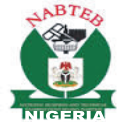 BRIEF HISTORY OF NATIONAL BUSINESS AND TECHNICAL EXAMINATIONS BOARD NABTEB
BRIEF HISTORY OF NATIONAL BUSINESS AND TECHNICAL EXAMINATIONS BOARD NABTEB
The National Business and Technical Examinations Board was established in 1992 to domesticate craft level examinations which were hitherto conducted by City & Guilds, Pittman’s, and Royal Society of Arts all of UK in accordance with the provisions of the National Policy on Education. Its establishment was the climax of an evolutionary process which spanned 15 years from 1977 to 1992 and in which FOUR Government Panels at different times were set up to review the place and structure of public examinations in our educational system.
Each of these Panels advocated and justified the multiplication of the examinations bodies, and in particular, a separate body to perform the functions which NABTEB now performs. The process began with the findings of Justice Sogbetun Commission of Enquiry (1978), which was set up in response to public outcry on perceived inefficiency and unchecked leakages of public examinations. This was followed by the Angulu Commission, which was set up as a result of WAEC’s presentation to the House of Representative Committee on Education in 1981 in which WAEC advocated the setting up of other examination boards in Nigeria “to reduce the burden of WAEC”. The third was the Okoro Panel set up in 1989 to review the Angulu Report. The forth was the Professor Akin Osiyale’s Task Force set up in 1991 “to evolve a strategy to reduce the burden of WAEC and bring about greater efficiency in the conduct of public examinations”.
The National Business and Technical Examinations Board (NABTEB) under Decree 70 of 1993, and other examinations bodies were thus established. Since its establishment, the findings of the Etsu Nupe Panel (1997), the Shonekan Vision 2010 (1997) Report, and the harmonized Report of the Etsu Nupe Panel and Vision 2010 reports have supported, directly and indirectly, NABTEB’s existence. The National headquarters of the Board is located at Ikpoba Hill, P. M. B. 1747, Benin City, and Edo State.
MISSION STATEMENT
Become a Globally Acknowledged Assessment Body for Craftsmen and Technicians.
VISION
NABTEB is a vision-led, mission-driven public institution with a vision:
Be a Globally Recognized Assessment and Certification Body Preparing Candidates for the World of Work and Academic/Professional Excellence.
EXAMINATIONS
The Board conducts the National Technical Certificate (NTC)/National Business Certificate (NBC) examinations as well as the advance level versions in the following trades/discipline:
- 1. General Education
- 2. Business Trades
- 3. Engineering/Construction Trades
- 4. Miscellaneous Trades
With its certificate being listed by the JAMB as a prerequisite for admission into tertiary institutions including the Universities, Polytechnics and Colleges of Education, enrolment has increased tremendously over the years.
The Modular Trades Certificate Examinations (MTCE) will commence in March 2004. The MTCE will service persons who wish to acquire effective capacity in components of a trade. For example,
Motor Vehicle Mechanics Work Trade (steering and braking system mechanic work module);
Catering Craft Trade (food preparation module);
Secretarial Studies Trade (typewriting 35WPM for Typist II module);
Book Keeping Trade (purchasing and supply module).
NABTEB has achieved a lot in its twelve (12) years of existence. These include:
1. Membership of the International Association for Education Assessment (IAEA) and Association for Education Assessment in Africa (AEAA).
2. Development of modular Curricular in Collaboration with National Board for Technical Education (NBTE),
3. Building and acquisition of housing facilities for its operations nation-wide e.g. the Board’s liaison office in Abuja, the headquarters office Complex in Benin City
4. Improved Staff Training, development and welfare.
5. Steady development of examination administration and the full computerization of its examination operation.
FUNCTIONS OF THE BOARD
The National Business and Technical Examinations Board was established with the promulgation of Decree 70 of August 1993 and was charged with the responsibility to:
Conduct examinations leading to the award of the;
– National Technical Certificate (NTC)
– Advanced National Technical Certificate (ANTC)
– National Business Certificate (NBC)
– Advanced National Business Certificate (ANBC)
– Modular Trade Certificate (MTC);
- Take over the conduct of Technical and Business Examinations hitherto conducted by the Royal Society of Arts of London, City and Guilds of London and the West African Examinations Council;
- Issue results, certificates and make awards in examinations conducted by the Board;
- Conduct other specified examinations on behalf of or in collaboration with other examination bodies or agencies such as the London Chamber of Commerce or the Institute of Chartered Accountants of Nigeria etc;
- Conduct common entrance examinations into Technical Colleges and allied institutions;
- Monitor, collect and keep records of continuous assessment in Technical Colleges and allied institutions towards the award of certificates in National Business and Technical Examinations;
- Conduct research; publish statistics and other information in order to develop appropriate examinations, tests and syllabi in technical and business studies;
- Prepare and submit to the Secretary an annual report on standards of examinations and other related matters; and
- Carry out such other activities as are necessary or expedient for the full discharge of all or any of the functions conferred on it under the Decree.
ADMINISTRATIVE STRUCTURE
The Board carries out its activities through seven (7) departments and a directorate in the Registrar’s Office. Dr. Olatunde Aworanti is the Registrar/Chief Executive of the Board ably supported by Director/HOD of the Departments.
These Departments include:
– Administration
– Information & Communications Technology (ICT)
– Finance & Accounts
– Registrar’s Office
– Examination Development
– Examination Administration
– Research & Quality Assurance
The above reflects the new structure of the Board in line with public service provision as well as increase efficiency and effectiveness.
NABTEB is run by a Management team composed of the Heads of Departments listed above under the leadership of the Registrar/Chief Executive. The Federal Ministry of Education through a Governing Board (GB) constituted by the enabling NABTEB Act 70 of 1993 generally oversees the activities of NABTEB
Downloads
Achievements / Challenges of the Board October, 2011 Click Here
NABTEB Mandate Click Here
Integration of “Soft Skills” Assessment into Public Examining in Technical and Vocational Education (TVE) Click Here
Why Candidates fail in Public Examinations Click Here
Strategies for Managing Examination Malpractices in Public Examinations Click Here
Source: http://www.nabtebnigeria.org/nabteb-in-brief/
Also don’t hesitate to sign up for our Newsletters, like us on Facebook, follow us on Twitter and Google+



Leave a Reply